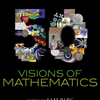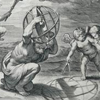News
As intelligent life forms in many universes join together to mark the 50th anniversary of Doctor Who, we thought we'd add our own little anniversary acknowledgement by revisiting the Plus posters' moment of fame!
How to make a hard problem easy by changing the way you look at it.
A damaged space station, no ground communications, no power, and only one chance to get it right. No, it's not a movie but the words of astronaut Michael Foale, who used maths to save a space station — and his life.
We're now proud to announce that 50: Visions of mathematics is with the printers (well, nearly) and will be out for the world to read in spring 2014.
It's Ada Lovelace day, celebrating the work of women in mathematics, science, technology and engineering!
If chemistry makes you think of white lab coats and green liquids then think again. This year's Nobel prize goes to three researchers who "took chemical experiment into cyberspace".
The 2013 Nobel prize in physics goes to Peter Higgs and François Englert for proposing the mechanism that gives things mass.
Next week will be an exciting one for a handful of scientists with the announcement of the 2013 Nobel prizes. With the recent experimental confirmation of the Higgs boson last year at the Large Hadron Collider, rumours are beginning to swirl that the physics prize might go to some of the physicists who predicted its existence and the mechanism that gives mass to matter in the Universe.
What happens when you shrink infinity to a point? You get a sphere!
James Clerk Maxwell realised, in 1864, that electricity and magnetism were just two sides of the same coin and that light was made up of electromagnetic waves. He developed an elegant theory describing the unified force of electromagnetism and the equations that describe the dynamics of an electromagnetic field now carry his name.


